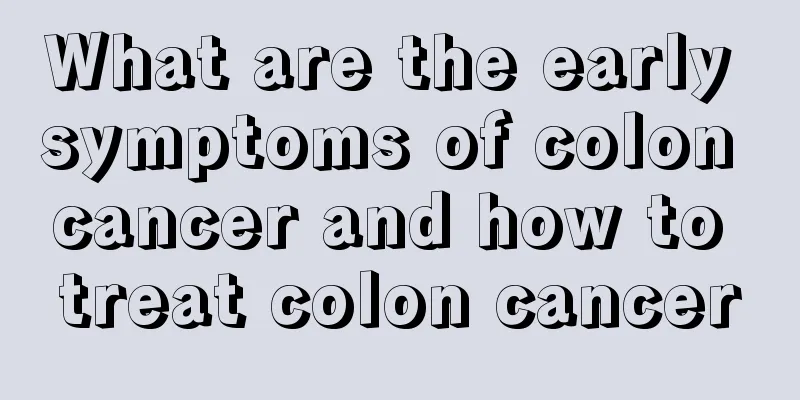|
What are the early symptoms of colorectal cancer and how to treat it. Cancer is a disease that everyone is afraid of. The harm of cancer in life is huge, so we must understand cancer. Colorectal cancer is a common cancer. Today, let us take a look at the early symptoms of colorectal cancer, the causes of colorectal cancer, and how to treat colorectal cancer. I hope it will be helpful to everyone. Early symptoms of bowel cancer.
Any disease will have certain symptoms, and colon cancer is no exception. Today we will look at the early symptoms of colon cancer.
1. Colorectal cancer is a malignant tumor disease. Generally speaking, patients with this disease will have obvious abdominal distension and abdominal pain, which is caused by intestinal function problems. In addition, if the disease is not well treated and controlled, the situation will become more and more serious, and the patient will also vomit, which is an obvious symptom of colorectal cancer.
2. Another obvious symptom of colorectal cancer patients is blood in the stool. When the condition is not serious, there may be blood in the stool, but when the condition is serious, dark red blood will flow out of the anus. That is, the secretion of stool and blood is a very serious problem, and it is also one of the early symptoms of colorectal cancer.
3. Patients with colorectal cancer will experience symptoms of dizziness and discomfort, that is, anemia, which is caused by long-term bleeding in the stool, because there are tumors in the colorectal area, colorectal stenosis, and even ulcers and erosions, which are also symptoms of colorectal cancer.
4. Patients with colorectal cancer will have severe diarrhea, that is, a change in bowel habits. The number of times they go to the toilet every day increases, and the stool is not much, or even no. Just a little mucus, the problem is very serious, so constipation and diarrhea are both symptoms of colorectal cancer.
What are the causes of bowel cancer?
Cancer cannot appear without reason, so what is the cause of colon cancer?
1. Dietary factors.
Diet is one of the most common causes. If the patient is very irregular in his daily life and often feels hungry, it will put a lot of pressure on the stomach and intestines, which is likely to lead to colon cancer.
In addition, a high-fat, high-meat, and low-fiber diet can easily lead to colorectal cancer. A high-fat diet can easily lead to an increase in deoxycholic acid and lithocholic acid in the stomach and intestines, both of which are carcinogenic.
2. Genetic factors.
Cancer has obvious familial clustering, and this is also true for colorectal cancer, so genetic factors cannot be ruled out.
Genetics is also a common cause. Through investigation, we know that if there is a colorectal cancer patient in the family, the probability of other family members suffering from colorectal cancer will be much higher than that of ordinary people.
3. Polyps.
Intestinal polyps are intestinal diseases that we often encounter. After the patient suffers from this disease, it must be actively treated, otherwise the condition will become serious and lead to diseases such as colorectal cancer.
4. Stimulation of chronic inflammation.
The incidence of colorectal cancer in patients with ulcerative colitis is 5-10 times higher than that in the normal population. Because the intestines are constantly stimulated by chronic inflammation, it is easy to cause colorectal cancer.
Is bowel cancer contagious?
The incidence of colorectal cancer is between 40 and 50 years old, the median age group is around 45 years old, people under 40 years old account for about 1/3 of all cases, and people under 30 years old account for about 10%. Compared with foreign countries, the incidence of colorectal cancer in my country is between 10 and 15 years old, and people under 30 years old account for 11%-13%, which is the main feature of colorectal cancer in my country. Like other malignant tumors, the cause of colorectal cancer is still unclear, and may be related to the following factors.
1. Environmental factors: Among various environmental factors, dietary factors are very important. The incidence of colorectal cancer is positively correlated with the consumption of high fat in food. In addition, it may also be related to the lack of trace elements and changes in living habits.
2. Genetic factors: There have been reports of families with colorectal cancer both at home and abroad, and the number of patients with family clusters of colorectal cancer who die from colorectal cancer is significantly higher than that of ordinary people.
3. Colorectal adenoma: The incidence of colorectal adenoma is quite consistent with colorectal cancer. According to statistics, the incidence of colorectal cancer in patients with one adenoma is 5 times that of patients without adenoma, and the incidence of patients with multiple adenomas is 1 times that of patients with a single adenoma.
4. Chronic colorectal inflammation: The prevalence of colorectal cancer is positively correlated with the prevalence of schistosomiasis. It is generally believed that some of the intestinal inflammation caused by schistosomiasis may lead to cancer. Other chronic inflammations of the intestine may also lead to cancer, such as ulcerative colitis, which has a 3%-5% chance of cancer.
For the treatment of colorectal cancer, we need to know more about the common sense of colorectal cancer, so we need to know more about the causes of colorectal cancer. In order to better treat colorectal cancer, we also need to know more about the early symptoms of colorectal cancer and try to detect the disease as soon as possible. So what are the early symptoms of colorectal cancer?
Main symptoms: changes in bowel habits and blood in the stool. Most of them are manifested by an increase in the frequency of bowel movements, unformed or loose stools, and mild abdominal pain before defecation; blood in the stool is an important symptom, manifested as bright red or dark red stools, often accompanied by mucus.
Abdominal pain is also an early symptom. The pain is mostly in the middle and lower abdomen, and the degree is not severe. It is often ignored as dull pain. As for abdominal distension, abdominal mass, anemia and intestinal obstruction, they are late symptoms of colorectal cancer.
In short, I believe everyone can understand whether colon cancer is contagious.
Everyone must pay attention to the early symptoms of colorectal cancer. Once discovered, don't take chances. Be sure to go to a regular hospital for relevant examinations to avoid the occurrence or deterioration of colorectal cancer.
How is bowel cancer treated?
One is surgical treatment.
The treatment of colon cancer is a comprehensive treatment plan with surgical resection as the main treatment. Radical resection + regional lymph node dissection is often used for patients with stage I, II, and III. The scope and method of radical resection are determined according to the location of the cancer.
If stage IV patients develop intestinal obstruction or severe intestinal bleeding, radical surgery should not be performed for the time being. Palliative resection can be performed to relieve symptoms and improve quality of life.
The basis of radical cancer treatment is surgery. Rectal surgery is more difficult than colon surgery. Common surgical methods include anal resection (very early near the anal verge), total mesorectal excision, low anterior resection, and abdominal anal sphincter abdominoperineal resection.
For stage II and III rectal cancer, preoperative radiation and chemotherapy are recommended to reduce tumorigenesis and local tumor occurrence before radical surgery.
The second is comprehensive treatment.
The adjuvant chemotherapy regimen of oxaliplatin combined with fluorouracil drugs (5-fluorouracil) is currently the standard treatment for patients with stage II cancer and some high-risk colorectal cancer patients, with a treatment duration of 6 months.
It is suitable for patients with rectal cancer who have not received neoadjuvant radiotherapy before surgery and need adjuvant radiotherapy after surgery.
The treatment of colorectal cancer is mainly chemotherapy. Chemotherapy drugs include 5-fluorouracil, capecitabine, oxaliplatin, irinotecan, bevacizumab, cetuximab, panitumumab, etc. Common chemotherapy regimens include: FOLFOX, XELOX, FOLFIRI, etc. On the basis of chemotherapy, targeted drug therapy (bevacizumab, cetuximab, panitumumab) is appropriately combined.
The third is radiotherapy.
Currently, the combined treatment of surgery and radiotherapy has better effects and has been studied more, including preoperative radiotherapy, intraoperative radiotherapy, postoperative radiotherapy, sandwich radiotherapy, etc.
For patients with advanced rectal cancer, local tumor infiltration, and contraindications to surgery, palliative radiotherapy should be used to relieve symptoms and reduce pain.
Summary: Colon cancer is a very dangerous disease. It can be said that if colon cancer is not treated in time, the result can only be death. Therefore, we must pay attention to the symptoms of colon cancer in life. Only in this way can we judge whether our body is safe and better protect our health. |










